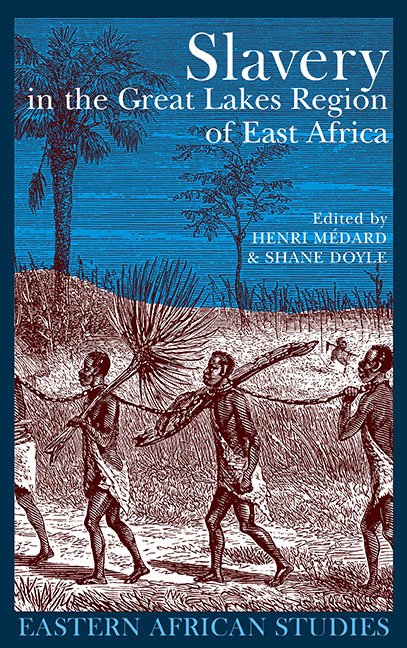Book contents
- Frontmatter
- Dedication
- Contents
- List of Maps & Tables
- Notes on Contributors
- Introduction
- 1 Violence, Marginality, Scorn & Honour: Language evidence of slavery to the eighteenth century
- 2 Notes on the Rise of Slavery & Social Change in Unyamwezi c. 1860 –1900
- 3 Slavery & Forced Labour in the Eastern Congo 1850 –1910
- 4 Legacies of Slavery in North West Uganda: The story of the ‘One-Elevens’
- 5 Human Booty in Buganda: Some observations on the seizure of people in war c.1700 –1890
- 6 Stolen People & Autonomous Chiefs in Nineteenth-Century Buganda: The social consequences of non-free followers
- 7 Women's Experiences of Enslavement & Slavery in Late Nineteenth- & Early Twentieth-Century Uganda
- 8 Slavery & Other Forms of Social Oppression in Ankole 1890 –1940
- 9 The Slave Trade in Burundi & Rwanda at the Beginning of German Colonisation 1890 –1906
- 10 Bunyoro & the Demography of Slavery Debate: Fertility, kinship & assimilation
- References
- Index
8 - Slavery & Other Forms of Social Oppression in Ankole 1890 –1940
Published online by Cambridge University Press: 11 August 2017
- Frontmatter
- Dedication
- Contents
- List of Maps & Tables
- Notes on Contributors
- Introduction
- 1 Violence, Marginality, Scorn & Honour: Language evidence of slavery to the eighteenth century
- 2 Notes on the Rise of Slavery & Social Change in Unyamwezi c. 1860 –1900
- 3 Slavery & Forced Labour in the Eastern Congo 1850 –1910
- 4 Legacies of Slavery in North West Uganda: The story of the ‘One-Elevens’
- 5 Human Booty in Buganda: Some observations on the seizure of people in war c.1700 –1890
- 6 Stolen People & Autonomous Chiefs in Nineteenth-Century Buganda: The social consequences of non-free followers
- 7 Women's Experiences of Enslavement & Slavery in Late Nineteenth- & Early Twentieth-Century Uganda
- 8 Slavery & Other Forms of Social Oppression in Ankole 1890 –1940
- 9 The Slave Trade in Burundi & Rwanda at the Beginning of German Colonisation 1890 –1906
- 10 Bunyoro & the Demography of Slavery Debate: Fertility, kinship & assimilation
- References
- Index
Summary
Introduction
Among all the kingdoms and societies of East Africa, itself an underresearched region, the claim can reasonably be made that the least studied and worst understood servile institutions were those of the precolonial kingdom of Nkore and its western neighbours that would be merged into the colonial district and Kingdom of Ankole (see Map 4). The reasons for this obscurity and an attempt to make a belated assessment of slavery and other forms of servitude in Ankole are the subject of this chapter.
Searching for Slaves
In 1940, Kalvero Oberg, a Brazilian anthropologist, published what would become a classic study of the political system of Ankole. Lying at the western edge of the kingdoms area of the Great Lakes region, Ankole, like its southern neighbours, Rwanda and Burundi, was described in terms of the sharp divisions of class or caste. The gulf that separated Bahima pastoral rulers from their so-called Bairu agricultural countrymen would come to dominate the politics and literature of colonial Ankole down to the present. The result for the study of slavery and other forms of dependent labour in Ankole, as Oberg succinctly put it, was that ‘Very little could be learned about slavery in Ankole.’ This chapter proposes to examine why so little has been learned about slavery in Ankole, despite the growth of interest in that institution in Africa and globally in the second half of the twentieth century. In doing so, we may come to learn more about slavery per se, about other forms of unpaid and dependent labour, and perhaps even about the nature of the complex, class-based and conflict ridden society that was the Ankole kingdom from the late nineteenth century until its end in 1966.
Why, then, is the history of slavery in the Ankole kingdom and district so obscure? I will offer three explanations for the difficulties faced by Oberg in the 1930s and by other researchers ever since. The first has to do with the mis-description of the so-called Bairu as ‘serfs’ and sometimes as ‘slaves’ in the earliest literature which also portrayed the Bahima as if they were the only free citizens or subjects of the Nkore kingdom.
- Type
- Chapter
- Information
- Slavery in the Great Lakes Region of East Africa , pp. 189 - 209Publisher: Boydell & BrewerPrint publication year: 2007



